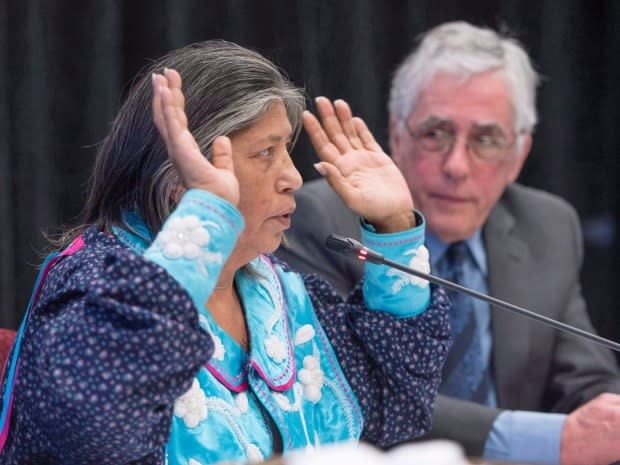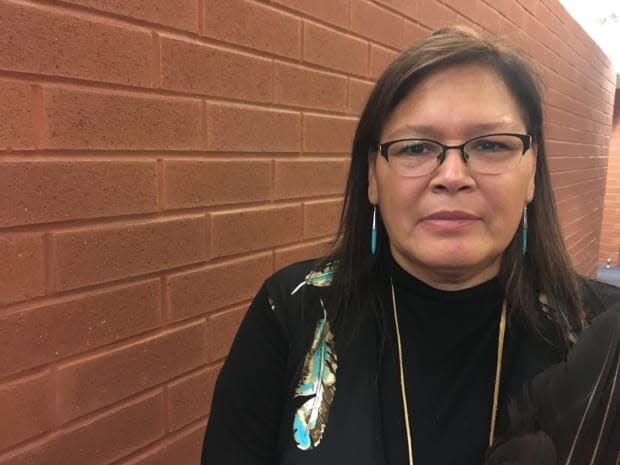Quebec should apologize for systemic discrimination in treatment of Indigenous people, Viens report says
The Quebec government should apologize to First Nations and Inuit for the harm they have endured as a result of provincial laws, policies and practices, says the author of a damning report into the treatment of Indigenous people.
The recommendation is the first of 142 calls to action laid out in retired Superior Court justice Jacques Viens's 520-page report released Monday.
"The unequal relations that have been established have deprived Indigenous peoples of the means to allow them to fulfil their own destiny and have, in the process, given a certain mistrust of public services," Viens said Monday in Val-d'Or, the northern mining community where it was released.
In the report, Viens said it is "impossible to deny" Indigenous people in Quebec are victims of "systemic discrimination" in accessing public services.
He said improvements are needed across the spectrum, including in policing, social services, corrections, justice, youth protection and mental-health services, as well as to the school curriculum to properly reflect the history of First Nations and Inuit in the province.
He also recommended the province's ombudsman be put in charge of ensuring the calls to action are implemented.

The report is the result of more than nine months of testimony about the decades of abuse, mistreatment and neglect endured by Indigenous people.
The inquiry was launched in December 2016 by the former Liberal government, under pressure to act in the wake of a Radio-Canada investigation into allegations of police misconduct against Indigenous women in Val-d'Or, a city 500 kilometres northwest of Montreal.
Viens was given a broad mandate: To look into the treatment of First Nations and Inuit people in Quebec by the public service. The commission wrapped up its hearings last December.
A total of 1,188 stories and expert opinions were shared over 38 weeks of hearings.
Although the hearings were held mainly in Val-d'Or, the commission also travelled to Mani-Utenam, Mistissini and Montreal, as well as Kuujjuaq and Kuujjuarrapik in northern Quebec.
In all, 277 citizens came forward with personal stories of having dealt with police, hospital staff and other public services, including representatives of the province's youth protection agencies and the justice system.
Quebec Premier François Legault said Monday he would look closely at the report and its recommendations. He said it's clear previous provincial governments must bear responsibility for the poor treatment of First Nations people and Inuit.
"There are many worrisome things in the report and we need to change the way we provide services to Indigenous people in Quebec," Legault said on Radio-Canada's Tout un matin.
Legault is set to meet with Indigenous leaders and address the National Assembly on Wednesday about the report.
Public Security Minister Geneviève Guilbault, who was in Val-d'Or for the report's release, added the government had called a meeting for Oct. 17 with Indigenous leaders to discuss next steps.
She, too, said the findings were "very troubling."

'Commissions come and go'
In a statement, the advocacy group Quebec Native Women expressed concern the inquiry's broad mandate had shifted the focus away from those who came forward with allegations against Quebec police.
"We welcome this work and hope that finally these findings of failure will find appropriate remedies," the statement said.
"On the other hand, it would be wrong to believe that the commission has duly fulfilled its mandate with Indigenous women."

Edith Cloutier has been at the helm of the Val-d'Or Native Friendship Centre for 28 years and was a key figure in helping Indigenous women in that city come forward with allegations of abuse at the hands of provincial police officers in 2015.
The report becomes an important tool for the work activists do to fight racism and build bridges with non-Indigenous communities across the country, Cloutier said.
"There's a lot of research that was done — and we have elements that would help us work at bridging that gap," she said.
The commission's recommendation that the government apologize to First Nations and Inuit communities will set the stage for what will unfold in terms of the following recommendations, she also noted.
"We have to … commend the fact that [Viens'] work wouldn't have any sense if it wasn't for the women that spoke out, and then the different people that told their stories — Indigenous people that have lived experiences within the public services."

Ghislain Picard, regional chief of the Assembly of First Nations for Quebec and Labrador, commended the report.
But he said what he really wants is accountability from police about their treatment of Indigenous women.
"What's missing is obviously the situation that triggered this commission," he said. "This is the issue that we least talk about in the report."
The association of Quebec police officers said in a statement that it agrees with a majority of the recommendations in the Viens report, but said the report constitutes a collection of "hearsay evidence."
"The report contains testimonies and opinions from many individuals, as well as observations and opinions from the commissioner, as well as his interpretation of the documents submitted by the various parties.
"In no case can this report be treated as a judgment nor can it be said that its conclusions are based on legal evidence," the statement said.


